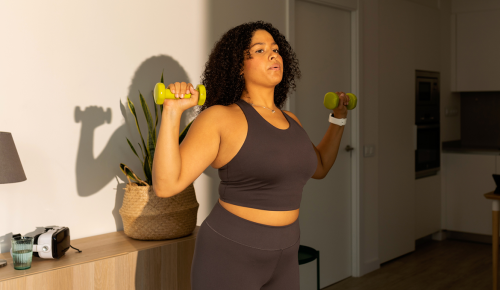Have you ever noticed just how often fitness instructors and influencers tout the importance of visualization? Heck, some boutique fitness studios, like Orangetheory, go so far as to plaster their walls with motivational phrases to assist in the visualization process.
Experts in This Article
New York-based physical therapist at Hudson Premier Physical Therapy
While witnessing your potential physical success in your mind’s eye can help enhance focus and encourage confidence, visualization practices have benefits that reach beyond the purely mental. According to a 2014 study conducted by researchers at the Ohio University Heritage College of Osteopathic Medicine, mental imagery exercises can actually prevent physical muscle weakness—even without literally moving a muscle. Simply imagining yourself working out could delay muscle atrophy, and make you stronger.
Who knew the power of thought really is, well, so powerful?
How does visualization strengthen the muscles?
The Ohio University researchers tested their mind-over-muscles theory by putting study participants in an immobilizing cast around their wrist for four weeks. While one group was told to vividly visualize flexing their arm muscles for 11 minutes five days per week, the other group wasn’t given any type of instruction. Once everyone’s casts were removed, researchers found that those who had flexed with all their mental might ended up being two times stronger than the others.
Though it wasn’t just their muscles that were stronger, the neuromuscular pathways in their minds were, too—which was proven via magnetic imaging, and likely the cause of the increased physical strength.
“What our study suggests is that imagery exercises could be a valuable tool to prevent or slow muscles from becoming weaker when a health problem limits or restricts a person’s mobility,” study author Brian Clark, a professor of physiology and neuroscience at Ohio University Heritage College of Osteopathic Medicine, said in a press release.
Needless to say, these findings are rich in potential for folks undergoing neurorehabilitation (like after a stroke), as well as those who may simply be trying to recover from an injury. For seniors who may not be able to work out as heartily as they used to, actively imagining gym time could keep their muscles stronger.
Is it worth trying?
Some scientists in the field believe that more research is needed to concretely determine the effectiveness of visualization. “Despite a voluminous literature on this subject, there is no definitive understanding of the effects of mental imagery perspectives on muscle strength,” one scholarly article on the subject, which was published in the Journal of Sports Science & Medicine in 2016, reads. “In fact, the literature presents different and sometimes opposing views.”
Nonetheless, physical therapist Sandra Gail Frayna, who is the founder of Hudson Premier Physical Therapy & Sports in New Jersey, and who is well versed in the world of rehabilitation, says that this strategy absolutely does have its benefits.
“Mental imagery exercises are a neurocognitive approach to visualization techniques often used for people looking to relax and get into a better mindspace where they create experiences with sensory information in their minds without having the stimulus upfront,” she explains. Self-talk, setting goals, meditation, and quiet visualization are all examples of this. “Practicing these imagery exercises—which can either be visual, kinesthetic, or auditory—is a healthy coping mechanism.”
And that goes for anyone looking to make the most of a poor situation—not just injured athletes. “Having high stress situations puts one in a tense psychological state, so being immersed in this will activate the motor region of the brain and change performance and even a mental state,” Frayna says. “Focusing on mental images without having that external stimuli can prove to be just as helpful as physical exercises.”
Athletes often use this approach to prep for competitions without overexerting their bodies. Trainers will coach them to call on as many senses as possible—imagining how an exercise looks, feels, maybe even how it sounds—to make this strategy most effective.
So the next time if you find yourself in a position where physical exertion isn’t possible—or in an instance where you simply want to approach your fitness from a more all-encompassing stance—remember that picturing your performance might just be the secret to your success.
Oh hi! You look like someone who loves free workouts, discounts for cutting-edge wellness brands, and exclusive Well+Good content.Sign up for Well+, our online community of wellness insiders, and unlock your rewards instantly.
Sign Up for Our Daily Newsletter
Get all the latest in wellness, trends, food, fitness, beauty, and more delivered right to your inbox.
Got it, you've been added to our email list.











